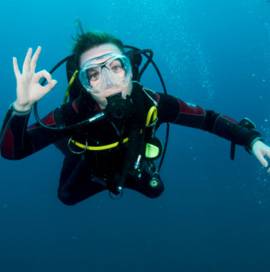Going Solo
Posted: Jul 04 in Dive Blog tagged solo diving by JanWhy some experienced divers may benefit from going buddy-free

If you’ve been on an elementary school field trip, you’re undoubtedly familiar with the buddy system. It’s a system that makes a lot of sense, particularly for the inexperienced: if something goes wrong, your buddy is there to help you and vice versa. During our open water dive certification we learned to do equipment checks with our buddies before jumping in the water, we learned rules about how far apart we can be and we’re trained to count on our buddies for assistance as well as provide it to them.
If you’re an avid diver, you may have a dedicated dive buddy, like a close friend or relative who has been there with you since you first took up Scuba. But as you become more experienced or diving becomes a bigger part of your life, you may find yourself wanting to take dive trips when your best buddy isn’t available. You may go on a chartered dive outing on your own and find yourself paired up with someone less experienced or less-than-reliable, a stranger you’re not sure you can count on who may need a babysitter the entire time you’re underwater.
A random buddy may be better than no buddy in the event of an emergency, but what if your random buddy creates more problems than he corrects? Experienced divers often face this dilemma, paired with a novice partner who needs mentoring and support but offers little in return. We’re taught to never dive alone, but diving with someone incapable of offering help can create a false sense of security and put more pressure on your own shoulders—wouldn’t a solo dive be more enjoyable and perhaps even safer in this scenario?
When it’s OK to Go It Alone
Much like the veteran hiker or mountain climber who is capable of tackling Mother Nature’s challenges alone, solo diving requires self-sufficiency and an ability to handle any emergency situation without assistance. The qualified solo diver understands his or her personal limitations and stays within them. He or she is unconcerned about whether or not an inexperienced dive partner will be able to help in an emergency, having already developed a capability for self-rescue that makes help from other divers unnecessary.
For these individuals, solo diving may indeed be a viable option—but the practice still requires a good deal of training, preparation and planning. That’s where SDI’s Solo Diver course comes in, a popular class for the diving enthusiast ready to take the plunge alone. This course teaches all the ins and outs of diving alone, from extensive dive planning to accident prevention and the usage of the extra equipment you’ll need to be safe on your own.
Remember: Solo diving has earned its dangerous reputation for a reason.
Diving without a buddy can be incredibly dangerous for all but the most seasoned divers. For this reason, SDI’s Solo Diver Course requires all participants to have Advanced Open Water certification and 100 or more logged dives.
The buddy system is the unquestionable standard of recreational diving, but going solo may not be as taboo for divers with the know-how to be entirely self-sufficient. Diving with a buddy may make things safer and give you someone to share your experience with, but some expert divers may not want or need this. For them, solo diving is an option that makes a lot of sense.
